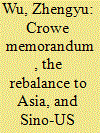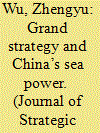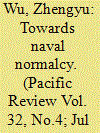|
|
|
Sort Order |
|
|
|
Items / Page
|
|
|
|
|
|
|
| Srl | Item |
| 1 |
ID:
146234


|
|
|
|
|
| Summary/Abstract |
Many contemporary academics and policy analysts have revisited the Anglo-German rivalry before 1914 to predict what may await China and the United States in the twenty-first century. However, few, if indeed any, have specified in what sense this comparison can be made. This paper attempts to fill this gap with a detailed analysis of the strategic parallels between the Anglo-German rivalry then and the China–US competition now through the lens of the Crowe Memorandum. The author argues that the basic parallel between the rise of Germany and the rise of China lies in the challenges they posed or pose to the dominant maritime power and system leader – Great Britain then and the United States today. This parallel also explains the similarity between the Triple Entente initiated by Great Britain prior to 1914 and the Rebalance to Asia launched by the United States in 2011. Furthermore, as in the case of the Anglo-German rivalry before 1914, the most crucial problem underlying the mounting China–US competition in recent years has been America’s deepening apprehension about the development of China’s anti-access/area-denial (A2/AD) and naval capabilities. This development, from the US perspective, is threatening to deprive the US of its most crucial instrument to influence the strategic equilibrium on the East Asian littorals. Based on the lessons of the Anglo-German rivalry prior to 1914, the essay also examines the potential for mitigating, if not eliminating, the mounting competition and misgivings between China and the United States.
|
|
|
|
|
|
|
|
|
|
|
|
|
|
|
|
| 2 |
ID:
188258


|
|
|
|
|
| Summary/Abstract |
This paper is an academic review of Red Star over the Pacific: China’s Rise and the Challenge to US Maritime Strategy (2nd Edition). It starts with a critical review of the book’s analytical framework for interpreting the development of China’s sea power in the previous decades. Then it scrutinizes respectively the book’s discussions of the logic and grammar of China’s sea power, and reveals simultaneously the contradictions embedded in China’s maritime policy and practice today. The paper ends up with an evaluation of the prospects of China’s sea power and its implications in view of the contradictions revealed.
|
|
|
|
|
|
|
|
|
|
|
|
|
|
|
|
| 3 |
ID:
165879


|
|
|
|
|
| Summary/Abstract |
On May 26th, 2015, China published its 10th Defense White Paper which integrated 'open seas protection', along with 'offshore waters defense', into its naval strategy. This shift in naval strategy, albeit largely anticipated, raises a series of important questions about China's maritime ambitions. This article seeks to analyze the causes, nature and challenges of China's latest shift in naval strategy, and its implications for Sino-US maritime relations. The article argues that China's latest shift in naval strategy is a logical corollary of the tension between China's expanding global interests and its asymmetric approach to sea power, and the Belt and Road Initiative (BRI) provides the necessary stimulus and justification for such a shift. China's new naval strategy, the paper contends, denotes that it will develop a Mahanian blue-water navy and a basic network of overseas bases in the years ahead. Those two developments are expected to pose a series of significant challenges for China's foreign policy. The article argues that China's new naval strategy presents both challenges and opportunities for China and the world. To accomplish 'open seas protection', China will probably have to modify its policies on a range of issues, and moderate its competitive stance in the near seas. Although China's new naval strategy need not be interpreted in a competitive framework, it does present China with a stark choice: either it pursues more friendly attitudes towards its maritime ambitions by modifying its current policy, or it will be increasingly confronted by a coalition of hostile states.
|
|
|
|
|
|
|
|
|
|
|
|
|
|
|
|
|
|
|
|
|